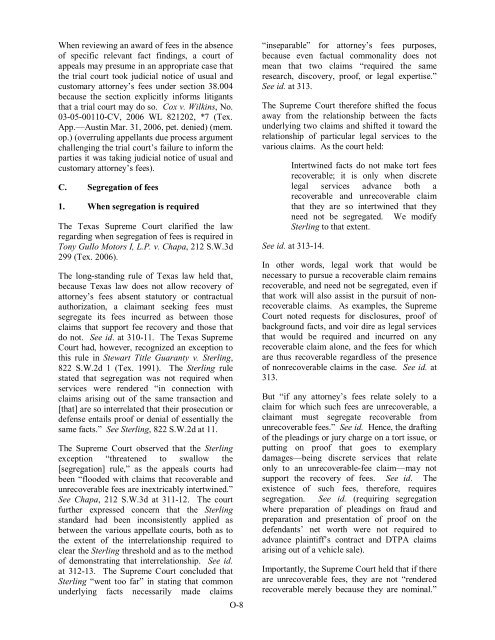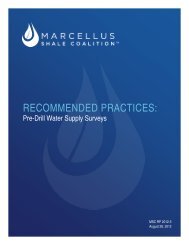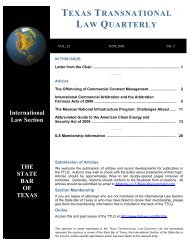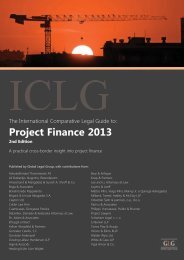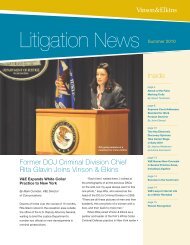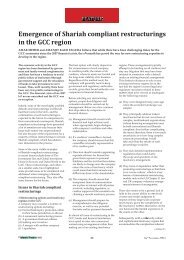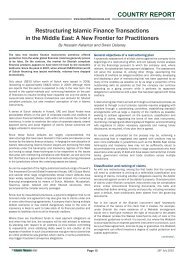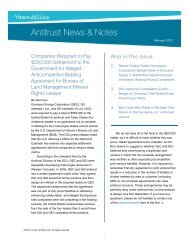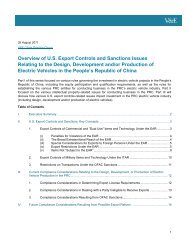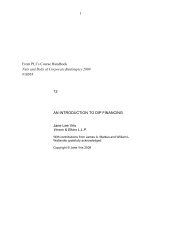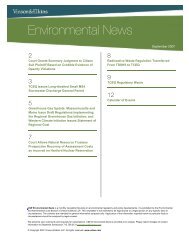Attorney's Fees Update - Vinson & Elkins LLP
Attorney's Fees Update - Vinson & Elkins LLP
Attorney's Fees Update - Vinson & Elkins LLP
You also want an ePaper? Increase the reach of your titles
YUMPU automatically turns print PDFs into web optimized ePapers that Google loves.
When reviewing an award of fees in the absence<br />
of specific relevant fact findings, a court of<br />
appeals may presume in an appropriate case that<br />
the trial court took judicial notice of usual and<br />
customary attorney’s fees under section 38.004<br />
because the section explicitly informs litigants<br />
that a trial court may do so. Cox v. Wilkins, No.<br />
03-05-00110-CV, 2006 WL 821202, *7 (Tex.<br />
App.—Austin Mar. 31, 2006, pet. denied) (mem.<br />
op.) (overruling appellants due process argument<br />
challenging the trial court’s failure to inform the<br />
parties it was taking judicial notice of usual and<br />
customary attorney’s fees).<br />
C. Segregation of fees<br />
1. When segregation is required<br />
The Texas Supreme Court clarified the law<br />
regarding when segregation of fees is required in<br />
Tony Gullo Motors I, L.P. v. Chapa, 212 S.W.3d<br />
299 (Tex. 2006).<br />
The long-standing rule of Texas law held that,<br />
because Texas law does not allow recovery of<br />
attorney’s fees absent statutory or contractual<br />
authorization, a claimant seeking fees must<br />
segregate its fees incurred as between those<br />
claims that support fee recovery and those that<br />
do not. See id. at 310-11. The Texas Supreme<br />
Court had, however, recognized an exception to<br />
this rule in Stewart Title Guaranty v. Sterling,<br />
822 S.W.2d 1 (Tex. 1991). The Sterling rule<br />
stated that segregation was not required when<br />
services were rendered “in connection with<br />
claims arising out of the same transaction and<br />
[that] are so interrelated that their prosecution or<br />
defense entails proof or denial of essentially the<br />
same facts.” See Sterling, 822 S.W.2d at 11.<br />
The Supreme Court observed that the Sterling<br />
exception “threatened to swallow the<br />
[segregation] rule,” as the appeals courts had<br />
been “flooded with claims that recoverable and<br />
unrecoverable fees are inextricably intertwined.”<br />
See Chapa, 212 S.W.3d at 311-12. The court<br />
further expressed concern that the Sterling<br />
standard had been inconsistently applied as<br />
between the various appellate courts, both as to<br />
the extent of the interrelationship required to<br />
clear the Sterling threshold and as to the method<br />
of demonstrating that interrelationship. See id.<br />
at 312-13. The Supreme Court concluded that<br />
Sterling “went too far” in stating that common<br />
underlying facts necessarily made claims<br />
O-8<br />
“inseparable” for attorney’s fees purposes,<br />
because even factual commonality does not<br />
mean that two claims “required the same<br />
research, discovery, proof, or legal expertise.”<br />
See id. at 313.<br />
The Supreme Court therefore shifted the focus<br />
away from the relationship between the facts<br />
underlying two claims and shifted it toward the<br />
relationship of particular legal services to the<br />
various claims. As the court held:<br />
Intertwined facts do not make tort fees<br />
recoverable; it is only when discrete<br />
legal services advance both a<br />
recoverable and unrecoverable claim<br />
that they are so intertwined that they<br />
need not be segregated. We modify<br />
Sterling to that extent.<br />
See id. at 313-14.<br />
In other words, legal work that would be<br />
necessary to pursue a recoverable claim remains<br />
recoverable, and need not be segregated, even if<br />
that work will also assist in the pursuit of nonrecoverable<br />
claims. As examples, the Supreme<br />
Court noted requests for disclosures, proof of<br />
background facts, and voir dire as legal services<br />
that would be required and incurred on any<br />
recoverable claim alone, and the fees for which<br />
are thus recoverable regardless of the presence<br />
of nonrecoverable claims in the case. See id. at<br />
313.<br />
But “if any attorney’s fees relate solely to a<br />
claim for which such fees are unrecoverable, a<br />
claimant must segregate recoverable from<br />
unrecoverable fees.” See id. Hence, the drafting<br />
of the pleadings or jury charge on a tort issue, or<br />
putting on proof that goes to exemplary<br />
damages—being discrete services that relate<br />
only to an unrecoverable-fee claim—may not<br />
support the recovery of fees. See id. The<br />
existence of such fees, therefore, requires<br />
segregation. See id. (requiring segregation<br />
where preparation of pleadings on fraud and<br />
preparation and presentation of proof on the<br />
defendants’ net worth were not required to<br />
advance plaintiff’s contract and DTPA claims<br />
arising out of a vehicle sale).<br />
Importantly, the Supreme Court held that if there<br />
are unrecoverable fees, they are not “rendered<br />
recoverable merely because they are nominal.”


